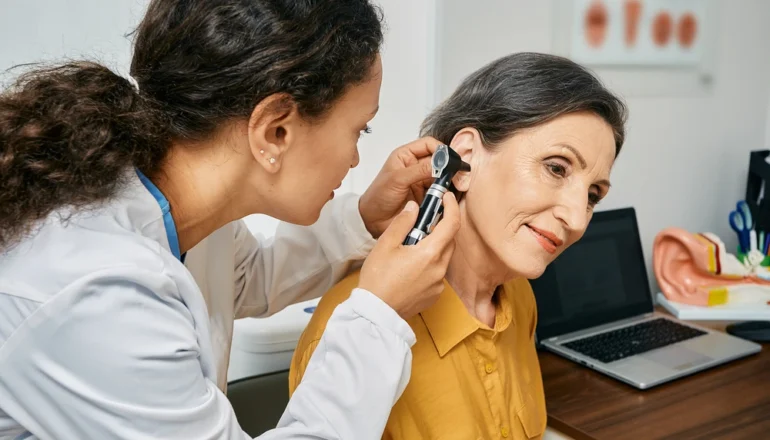Chirping, buzzing, roaring, crickets, hissing, humming…however you describe it – tinnitus can be bothersome! So where does this noise come from? And most importantly, how do you make it stop?
Tinnitus affects 20% of Americans. And while some tinnitus sufferers can ignore the pesky sound, others are debilitated by constant noise in their ears.
Although there is little information regarding the origin of tinnitus, we do have several well-researched theories on where the damage might start within a patient’s hearing. The inner ear is lined with tiny hair cells which move with sound waves and trigger electrical signals to the hearing nerve. Noise exposure can cause these hair cells to bend and break which then triggers impulses of sound to the brain. Many of you have likely experienced this after attending a loud concert that left you with a ringing sound in your ears. This can be temporary or sometimes the effects are permanent. It is worth mentioning that the bending and breaking of these inner ear hair cells also results in hearing loss; therefore, hearing loss is often accompanied by tinnitus. A similar theory implies that tinnitus is the brain trying to fill in for missing sounds it is no longer receiving from the auditory system due to hearing loss.
In addition to hearing loss, some medications, both prescription and over the counter, can cause or worsen tinnitus. Other causes might be ear infections or a blockage of the ear canal due to wax. Factors such as stress, lack of sleep, caffeine or salt intact have also been known to increase tinnitus.
While tinnitus can often become a significant annoyance, it is encouraging to note there have been several advancements in treatment options available for patients suffering from tinnitus. One such advancement is Mahana Tinnitus. Mahana Tinnitus is an innovative self-guided digital application to help individuals suffering from tinnitus. Users work through a series of therapeutic sound sequences, which aim to distract the user’s focus away from the underlying tinnitus perception. Additionally, Mahana Tinnitus offers educational content on how to better manage the condition providing the user with helpful techniques to decrease the perceived intensity of the symptoms. The effectiveness of the Mahana app is related to the compliance of the user. For individuals consistently using the app for 6 weeks; research shows a 61% success rate in the reduction of tinnitus’s effect on the user’s daily life. Consistent compliance for as little as 10 minutes a day can help provide improvement in a patient’s daily life.
Another development in the treatment of tinnitus is the Lenire tinnitus treatment. This treatment is guided by an Audiologist and uses bimodal stimulation to lessen the effects of tinnitus. During this home therapy, a patient listens to specific calming music while simultaneously utilizing the Lenire TongueTip to provide a mild pulsing stimulation to the surface of the tongue. This bimodal neuromodulation helps to more effectively reconnect the neural pathway in the brain. The therapy is adjusted and followed by an Audiologist. With the recommended two 30-minute sessions a day, research has shown a 91% improvement in the patients’ tinnitus for at least 12 months following treatment.
In addition to the above discussed new advances in tinnitus treatment, hearing devices continue to be a top recommendation for individuals with both hearing loss and tinnitus. If hearing loss is also present, a hearing aid is usually the first choice to manage the unwanted sounds and will help provide sound stimulation to mask the tinnitus. In most cases, the tinnitus can be measured or matched in the high frequencies which is also where most hearing loss occurs with loud noise exposure or aging, therefore killing two birds with one stone.
If you are experiencing tinnitus, you should schedule a hearing evaluation with a Doctor of Audiology. During the appointment, your symptoms, medications, and case history will all be discussed. In addition, a complete audiological examination, including a tinnitus evaluation, will be conducted. The Doctor of Audiology will then determine if further testing and/or referrals are necessary.
Tinnitus can certainly be a frustrating condition, but the good news is that if addressed correctly and proactively – there can be relief. For more information or to schedule a complementary evaluation, please contact me at cori@experthearingsavannah.com or 912.777.8580.



